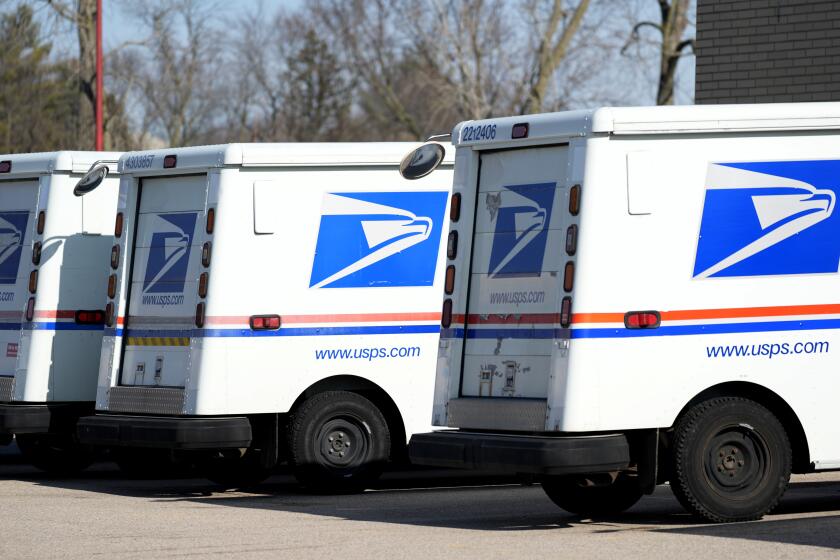Labor’s big-money focus on Prop. 32 may hurt chances of Prop. 30
SACRAMENTO — Labor unions are unloading tens of millions of dollars against a ballot measure that could limit their political clout in California, but the spending could come at a cost for one of their biggest allies: Gov. Jerry Brown.
The unions are pooling their money to fight Proposition 32, which would eliminate their primary political fundraising tool — paycheck deductions — at the same time Brown is counting on their support for his tax-hike initiative also on the ballot next month.
Polls show support for his measure ebbing as election day nears. But although Brown has signed labor-backed legislation and pushed high-speed rail construction that would create union jobs, there’s only so much money to go around.
“Labor dollars are being stretched,” said Steve Maviglio, a Democratic political consultant who has worked with unions but is not involved in either campaign.
Almost all the nearly $54 million raised to defeat the paycheck measure has come from unions, according to the most recent campaign filings with the state. And unions put up most of the money to gather petition signatures and push for Brown’s measure, contributing about three-fourths of the campaign’s roughly $42 million.
If voters reject the governor’s temporary tax increases, nearly $6 billion is set to be cut from the state budget, mostly from public schools. But unions say their political survival hinges on the outcome of Proposition 32, and that is where they’re sending the bulk of their resources.
“For working families, Prop. 32 is our No. 1 priority,” with Brown’s proposal second, said Willie Pelote Sr., California president of the American Federation of State, County and Municipal Employees.
For example, the California Teachers Assn., the state’s largest teachers union, has donated $20.5 million to fight Proposition 32 and $8 million to Brown’s tax campaign.
The latest USC Dornsife/Los Angeles Times poll showed voters rejecting Proposition 32. But its supporters may weaken unions no matter what happens, said Eliseo Medina, secretary-treasurer of the Service Employees International Union.
“Even if they lose, they bleed the unions,” he said, leaving labor less money to spend on legislative races and other campaigns.
Proposition 32 backers, who include anti-tax activists, Republican donors and business executives, describe it as an even-handed attempt to curb special-interest money in politics by preventing union and corporate donations to candidates.
Opponents say it will disproportionately affect unions, because paycheck deductions are not the way corporations typically raise political money. Labor leaders view the measure as the latest front in a nationwide effort to curb their influence.
More than 9% of the money fighting Proposition 32 has come from multiple union headquarters in Washington, including $2.8 million from AFSCME. The International Assn. of Fire Fighters has put in $700,000, and the International Brotherhood of Teamsters, $500,000.
Rob Stutzman, a Republican political consultant who supports Proposition 32, said unions can defeat the measure only if they outspend the competition.
“This is their line in the sand,” Stutzman said. If their opposition campaign fails, “it changes the way they do business.”
Charles Munger Jr., the wealthy GOP activist who helped bankroll the signature-gathering that put Proposition 32 on the ballot, has pumped $22 million into a campaign fund that has paid for television ads supporting the measure and radio spots opposing Brown’s tax hikes. An Arizona group called Americans for Responsible Leadership contributed $11 million to the same fund.
Separately, Munger and other Proposition 32 supporters have raised an additional $9 million. That includes a nearly $4.1-million donation from the America Future Fund, a conservative Iowa group connected to billionaire brothers and energy executives Charles and David Koch, who are active in Republican politics.
The governor’s campaign manager, Ace Smith, said he’s not worried about the fight over the paycheck initiative distracting from the governor’s measure, Proposition 30.
“If anything, it helps us. People are going to be out there in greater numbers working even harder,” he said. “We’re going to have what we need to win this race.”
Brown has won crucial support from many business leaders, and his opponents have collected less than $8 million for their campaign. But that doesn’t reduce his need for union help, said Jack Pitney, a political science professor at Claremont McKenna College.
The governor is also up against wealthy civil rights lawyer Molly Munger, Charles Munger’s sister, who has invested nearly $38 million in a push for her own tax measure.
At a time when Brown needs labor’s full support, Pitney said, “the army is divided.”
More to Read
Start your day right
Sign up for Essential California for news, features and recommendations from the L.A. Times and beyond in your inbox six days a week.
You may occasionally receive promotional content from the Los Angeles Times.







